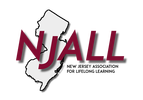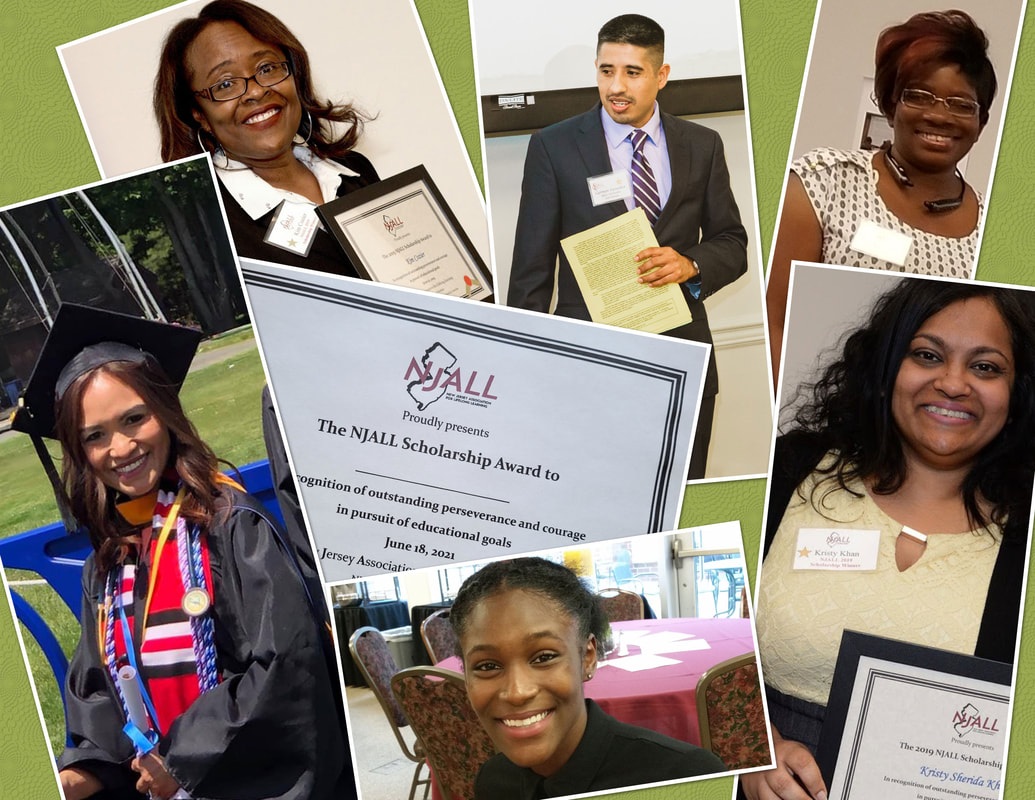|
This year the NJALL Annual Conference will take place fully online. The Conference will begin with the opening plenary session on May 12th, ollowed by three days of individual sessions. Each day will include multiple workshops on a range of topics, including: Literacy, Numeracy, Technology, ESOL, and insights from our Learner Writing Contest winners. Registration for the conference is $50 per person. Registered participants will have access to all of the sessions and will be provided with professional development certificates for sessions they attend in real time. Checks and hard copies of purchase orders must be received by May 1st to guarantee registration. Any cancellations must take place by May 1st to ensure a refund. Click here for more information and to register for the Conference. Please send any questions to njallmail@gmail.com Calling all Adult Educators! It's that time again! Will your students or graduates win a 2021 NJALL Scholarship this Year? Time for you to encourage eligible adult students and graduates with the potential to succeed in college, to apply for the 2021 NJALL Scholarships.
NJALL will award two scholarships on June 18, 2021, to two adults who earned a high school diploma by attending a New Jersey adult education program to prepare for a High School Equivalency Test or Adult HS and have been accepted to/or are attending college. Scholarship winners can receive up to $1000 per semester for full-time enrollment in higher education (pro-rated for part/time) to a maximum of $8,000, plus a Bonus for completing a 2-year or 4-year degree. To qualify, an applicant must be a resident of New Jersey. Scholarship applications are open to anyone regardless of gender, race, color, religion, age, sexual orientation or disabling condition. The 2021 Application with eligibility information is available: HERE All applications must be submitted, including all required documents, postmarked no later than May 10, 2021. The Adult Learning Writing Contest Magazine We are pleased to announce that the Insight 2020 magazine is available. You can download it at this link. Thank you to all of the the learners, tutors, teachers and program directors who make this contest possible. We hope you consider participating in the 2021 Learner Writing Contest. Thank you. NJALL njallmail@gmail.com Annual Conference May 12 – 15, 2021 (Online)
Due to the continuing pandemic, NJALL’s Annual Conference for 2021 will take place fully online. We will begin with an opening plenary session on May 12th, to be followed by three days of individual sessions. Each day will include multiple workshops on a range of topics. Registration for the conference is $50.00 per person. Registered participants will have access to all of the sessions and will receive professional development certificates for all sessions they attend in real time. If you are being covered by an organization, please make sure your name and email is on the purchase order the organization submits. An electronic copy should be mailed to njallmail@gmail.com. Individual registrations and purchase orders must be received by May 1st to guarantee registration. Any cancellations must take place by May 1st to ensure a refund. Please send any questions to njallmail@gmail.com NJALL is holding its seventh annual adult learner writing contest. This year we will award cash prizes in five categories - fiction, non-fiction, memoir, poetry and photography. All of the winners and selected other submissions will be published in a free magazine that will be available from our website in the summer of 2021. Winners and their teachers/tutors will receive printed copies of the magazine (when possible).
Categories Fiction Non-fiction Memoir Poetry Photography Prizes 1st Place - $100 2nd Place - $50 3rd Place - $25 Guidelines * All adult learners are eligible, including students in adult literacy programs, those in adult high schools or equivalency programs, those in developmental education programs, those enrolled in English language classes and students studying for citizenship. * Learners can submit one piece per category, except for poetry. Learners can submit up to five poems for consideration. Learners can send in submissions for multiple categories. * All submissions must be original and represent the work of the learner - not the work of their teacher or tutor. Teachers/tutors may help with spelling and grammar, but it should be limited in nature. We are using the honor system with regards to this. * English language learners can get help with translation, but the work should remain their own. Submitting Submissions need to be received by March 26th, 2021 at njallmail@gmail.com The email should identify the category of the submission. Submissions should include the learner's name and contact information and the name of the program or school they attend. The submission should also include a two or three sentence self-description of the learner. If the learner wishes to remain anonymous or use a pen-name, this information should be provided when the work is submitted. By entering the contest, the learner agrees to have their piece published in the magazine if it is selected. All those submitting work will be notified of the decisions by April 16th, 2021. You can download a copy of the call for submissions and guidelines here. Please send any questions to njallmail@gmail.com Acting as a Reviewer If you are interested in serving as a reviewer, please send an email to njallmail@gmail.com We are particularly interested in having learners serve on the review committee. Even though NJALL was not able to hold an in-person conference this year, we still wanted to honor the hard work of members of our adult education community. To that end, NJALL is pleased to highlight the work of two outstanding individuals. Barry Semple Lifelong Leadership Award Mariam Merced About thirty years ago, Mariam Merced, Director of Community Health Promotions at Robert Wood Johnson University Hospital, reached out to the New Brunswick Public Schools Adult Learning Center (NBALC), offering a Health Fair for students at the Center. Her vision included bringing volunteer physicians and other medical personnel to provide free health screenings. These included such medical concerns as blood pressure, diabetes, breast cancer, cervical cancer, HIV/AIDS and dental screening. NBALC’s initial reaction to this offer was very cautious, when considering all the possible logistical issues and ramifications. Mariam, however, had such a clear and passionate vision, and gave the gentle reassurance, “Don’t worry, we know how to do this.” After a thorough discussion of concerns, NBALC nervously agreed to be partners. At the first Health Fair in the early 90’s, Mariam’s team quickly set up the NBALC classrooms to resemble a health clinic. Cautiously, our students arrived and were escorted by volunteers to various screenings. Mariam’s team identified a large number of students with untreated, life threatening symptoms, who were followed up for immediate treatment. NBALC was hooked on what an incredibly important addition this was to its adult education program. That was the beginning. NBALC continues to hold annual Health Fairs, that last one in February 2020. It has been ongoing and expanding for thirty years due to the incredible vision of Mariam Merced. Currently, there are over 40 partners who collaborate to bring these services to the Center. In fact, screenings have, at times, been extended to the parents of children in the school district. Services include providing flu shots, cholesterol and glucose screening, blood pressure screening, dental screening, dermatology screening, HIV/AIDS testing, audiology screening, vision screening and even an opportunity to learn critical stress relieving relaxation techniques. Students who participate are provided a “Passport to a Healthy Life”, which they bring with them to each of the health screening locations to have signed by the medical personnel after the consultation. The Fair provides a safe space for providers to meet with those in the community who are in need of health care. Due to the high volume of new immigrant students at the NBALC, the Fair also serves as a bridge to connect them to the health care and social services system in the county. Another benefit of this huge undertaking is that high school students are recruited to gain valuable volunteer experience by assisting as escorts, registrars and translators. They are provided with certificates of appreciation for their volunteer time at the conclusion. Mariam Merced is more than worthy of this lifelong leadership award. Her compassion, knowledge, expertise, tenacity, passion and warmth have served her so well in bringing over 40 agencies to the table to collaborate in these efforts. She has effectively addressed one of the most important challenges which so many of our students face. It is hoped that by shining a light on the outstanding leadership efforts of Mariam Merced, others in our state will be inspired to investigate similar collaborations to benefit the students we serve. Teacher of the Year Award Susan Pristas Susan Pristas has served many roles as a volunteer teacher at Literacy Volunteers of Somerset County (LVSC), the most significant being the development of a Beginner ESL Program for under-served adults. Susan's tremendous dedication of time, energy, and whole-hearted commitment to creating a program, teaching students, and training fellow volunteers has been unparalleled. A program which began as a small pilot has expanded to include 120 students in two communities and is supported by 15 volunteers.
Susan is a retired teacher with a graduate degree and a long career teaching ESL, German and Spanish. LVSC does not have the budget to hire and retain someone of Susan's caliber and was thrilled that she offered her services without pay. In 2016, LVSC came to the conclusion that its traditional tutoring program was not meeting the needs of a growing population of Spanish speaking adults in the less affluent towns of our community. Susan identified, reviewed and created a beginning curriculum to suit the students' needs. She researched available classroom resources and then purchased (and donated) materials for the class. She then created outreach materials, and assisted with student assessment and enrollment. Finally, she piloted the first 10-week class. Eventually, she even mentored other tutors to take the materials and teach classes in other communities. During the pilot, Susan met with students every Saturday morning in the fall of 2017. The following Monday, she would come to the LVSC office (with coffee for the staff!) to reflect on the program and the lesson. What worked? What didn't? What adjustments needed to be made? She kept detailed record and copious notes, working with the utmost in professionalism and always keeping the students' best interests in mind. At the end of the ten weeks, Susan created a full curriculum and class rules so that the course could be repeated. Susan led two more classes in 2018 and two in 2019. She also figured out how to do at least some of the class via Zoom in the midst of the COVID lock-down. The program met with such success that a neighboring town requested a similar program. Four tutors who Susan trained were able to take Susan's curriculum to this new town. The number of beginner-level students LVSC is reaching in under-served communities has expanded exponentially. When Susan started, 35% of LVSC's students came from these communities. Today the percentage has grown to 50%. Student feedback also demonstrates Susan's effectiveness as a teacher. Here is some feedback from students: "She was really friendly and had patience with us." "I liked being here on Saturdays because I learned many new things." "Thank you for helping us to continue learning." Susan embodies the qualities of Teacher of the Year: she is a skilled teacher, kind mentor, treasured volunteer, and ideal role model who is generous with her time and talent. Let's be serious - we're all under a tremendous amount of stress. Our jobs, our relationships, our home life - everything has changed and not for the better. Many of the mundane tasks in our lives have become harder. The time we need to allot to daily tasks has become longer. All of this can erode our mental health. How do we find time for ourselves among these challenges?
Many of us are unaware how to get help and others are intimidated or embarrassed to seek help. Here are five resources that can help any who struggle with mental health issues: NJMentalHealthCares The Mental Health Association in New Jersey is a non-profit organization dedicated to helping New Jersey's residents achieve and maintain mental health through advocacy, education and services. In response to the COVID-19 pandemic, they have created the excellent New Jersey Mental HealthCares web-page which provides information and referrals for those in need of help. They can be reached either by email or phone seven days a week from 8am to 8pm. There is also a free and confidential online screening available. The site can be translated into several languages including Spanish, by choosing from a menu located at the bottom right of the page. Mental Health First Aid Training The mission of Mental Health Association in New Jersey includes educating the public on mental health and its related issues. As part of that objective, they have developed excellent Mental Health First Aid training. The training teaches non-professionals to identify a person suffering a mental health crisis, offer initial assistance, and connect the person with professional help. This training could be an asset for anyone working with the public. The National Alliance on Mental Illness, New Jersey The National Alliance on Mental Illness, New Jersey is a statewide non-profit group that seeks to help those with mental health issues and their families. The organization takes pride in its cultural outreach, public education, and anti-stigma programming. They have created a fairly comprehensive list of phone numbers and hotlines to organizations which provide help for those dealing with a wide range of mental health challenges and related issues. Division of Mental Health and Addiction Services' Directory of Mental Health Services The New Jersey Department of Human Services has its own Division of Mental Health and Addiction Services that aids those with serious and persistent mental illnesses. The division has assembled a Directory of Mental Health Services in New Jersey. It includes a wide assortment of providers who have been vetted by the state. The NJ Division of Mental Health and Addiction Services' Agency Listings The NJ Division of Mental Health and Addiction Services also provides a list of Mental Health agencies. Agencies may be a gateway to a deeper level of treatment than hotlines for those who need it. Additionally, this list is organized by state region giving it contrasting access points to the list above. We hope you will find these resources helpful. America prides itself on its standards of equity and justice, and much of our legislation reflects that spirit. However, knowing the laws, one's individual rights, and how "due process" works is as important a factor as the laws themselves. Unfortunately, our students often suffer from inequitable access to that information. Here are some resources that might help.
Five resources to help students understand legal issues that may come up during the COVID-19 pandemic: Understanding Legal Issues When a person needs information of a personal or confidential nature, they are frequently reluctant to approach a stranger to ask for help. The Legal Service of New Jersey - a non-profit legal aid organization - has set up a website to help overcome that obstacle. While not a replacement for actual legal advice or representation, the LSNJLAW website is a great place to gain a basic understanding of the legal issues involved in a specific situation. The website is easy to navigate and is divided into clear categories with access to resources, legal forms, manuals, and articles to help answer questions anyone might have. There is even a search function. Legal Services of New Jersey Legal Services of New Jersey, to quote their mission statement, "seeks to secure equal substantive and procedural justice for all economically disadvantaged people" and what greater mission is there? The organization manages a statewide effort to provide free legal assistance, information, and referrals to low-income people in civil matters. They can be reached either through the website's online intake form or by phone through their hotline. Just click on "EN ESPAÑOL" in the upper right corner to assess the Spanish version of the website. ACLU of New Jersey The American Civil Liberties Union was founded in 1920 in reaction to the U.S. government's clampdown of the labor movement. One hundred years later, the ACLU of New Jersey - our local branch of the organization - is still defending our civil rights. The organization not only advocates for equitable legislation, but represents individuals in court as well. If one of your students feels their civil rights are being violated, they can file a complaint with the ACLU of NJ at the link above. New Jersey Division on Civil Rights Discrimination is a daily part of many of our lives, ranging from the slight to the severe. The State of New Jersey has a specific department for handling discrimination in employment, housing, and places of public accommodation, the New Jersey Division on Civil Rights. As part of the state Office of the Attorney General, the Division on Civil Rights employs investigators, attorneys, and professional support staff to review discrimination complaints. The department also participates in educational outreach efforts on anti-discrimination laws. New Jersey Department of Community Affairs Landlord-Tenant Information The New Jersey Department of Community Affairs has a fairly comprehensive Landlord-Tenant webpage with a slew of information to inform residential landlords and tenants of their rights and responsibilities. The webpage provides links to informational PDFs on the pertinent laws regarding a comprehensive list of landlord-tenant issues ranging from condominium conversion, eviction, lease termination, foreclosures, and more. We hope you will find these resources helpful. This year has been filled with a multitude of momentous events and promises still more. However, 2020 Is significant for another reason - it is a Census year. Although this may seem less dramatic than many of today's headlines it is no less important. The Census count affects government funding levels for each region. It also determines how Congressional districts are drawn as well as how many members of Congress each state has. The numbers are used to determine needs for educational, housing, healthcare resources, and more.
Unfortunately, many of our students belong to populations that are described as "hard to count". According to the Census Bureau, the 2010 Census under-counted the African-American population by more than 800,000, and roughly one in three Hispanic people lives in a "hard to count" census tract. Poverty, housing insecurity, and language barriers are all factors that make a specific population "hard to count". Here are five resources to help students understand and participate in Census 2020: The Census Counts The Census Counts campaign is a partnership of community-based advocacy organizations that have partnered to help these "hard to count" populations to participate in Census 2020. Their excellent website serves as a great resource for this effort. The site includes a wide collection of informational resources and outreach tools which can help motivate a fuller level of Census participation. Interview outlining Census Efforts During COVID The Deputy Chief of Staff at New Jersey's Department of State, Lauren Zyriek Enriques, is interviewed by Univision's WUVP-DT, She outlines the timeline for Census efforts during the COVID crisis, explains safeguards put in place to protect undocumented residents, and gives information on how to avoid Census-related fraud. The interview is entirely in Spanish. Census online Thankfully, the U.S. Census Bureau has upped their game as well. For those with a connection to the internet, filling out the Census is easier than ever before. A resident can complete the Census form at this site and can choose from a variety of languages. Video Guides on How to Complete the Census While completing the form online is convenient, it can be intimidating if one has never done it before and is unsure of what is coming. Again the U.S. Census Bureau has provided an excellent resource by posting video guides on how to complete the Census form. These guides come in a multitude of languages including American Sign Language. One-on-One Help by Telephone Not everyone has access to the internet and some are uncomfortable using it. If a person needs one-on-one assistance, the U.S. Census Bureau has provided assistants who can be contacted by phone. Phone assistance can be obtained in a many languages. This document provides the telephone numbers and can easily be posted or handed out by adult education providers. Operators are standing by! We hope you will find these resources helpful. New Jersey's COVID-19 crisis has had tremendous, negative economic effects on so many in our community. To compound the situation, these effects heavily reinforce the inequities that already exist in our communities - inequities many of our students are already overly familiar with.
Here are five resources that can help students deal with financial challenges in these difficult times: NJ Department of Labor and Workforce Development Worker Benefits Not only does this pandemic threaten our health and the health of our loved ones, it also disrupts many of the finely balanced plans that allow our work lives to coexist with our family lives. Fortunately, the NJ Department of Labor and Workforce Development recognizes this and has created a single-page chart that clearly outlines under what conditions worker benefits are available during the COVID-19 disruption. The chart is also available in Spanish. NJ Department of Community Affairs Short-Term Rental Assistance Program New Jersey Department of Community Affairs is launching the COVID-19 Short Term Rental Assistance Program which will provide temporary rental assistance to low- and moderate- income households that have had a substantial reduction in income or have become unemployed due to the COVID-19 pandemic. The program will offer an initial three months of temporary rental assistance, with the option for renewal for an additional three months if needed. Approximately 20 percent of the rental assistance funds will be reserved for homeless families impacted by COVID-19. Further information on how to apply and Frequently Asked Questions, will be available on June 15th. Worker Benefits, Protections and the Coronavirus The pandemic has pushed New Jersey's unemployment claims to record highs. In response, the Department of Labor has constructed a web-page devoted to addressing the needs of those whose employment has been negatively affected by COVID-19. The site outlines many of the complicated situations a worker may find him or herself in, and lays out the worker's rights and options. Resources are available in a wide selection of languages. The Community FoodBank of New Jersey Hunger is much more common in New Jersey than any of us would like to admit. Almost 900,000 New Jersey residents are challenged by food issues and over 260,000 of them are children. The Community FoodBank of New Jersey is the state's largest anti-hunger organization working with volunteers and partners to assist those in need. Information on how to access the assistance they provide can be found on their website. NJ Division of Family Development SNAP and WFNJ Updates In response to the COVID-19 crisis, New Jersey has suspended many of the hurdles that might inhibit residents who participate in the state's Supplemental Nutrition Assistance Program (SNAP) and Work First New Jersey (WFNJ) from getting all of the assistance they need. The DFD has provided updates to these programs in a clear and conveniently accessed web-page. By using the drop down menu on the page's banner, interested individuals can access the information in their own language. We hope you will find these resources helpful. |
Categories |




 RSS Feed
RSS Feed
